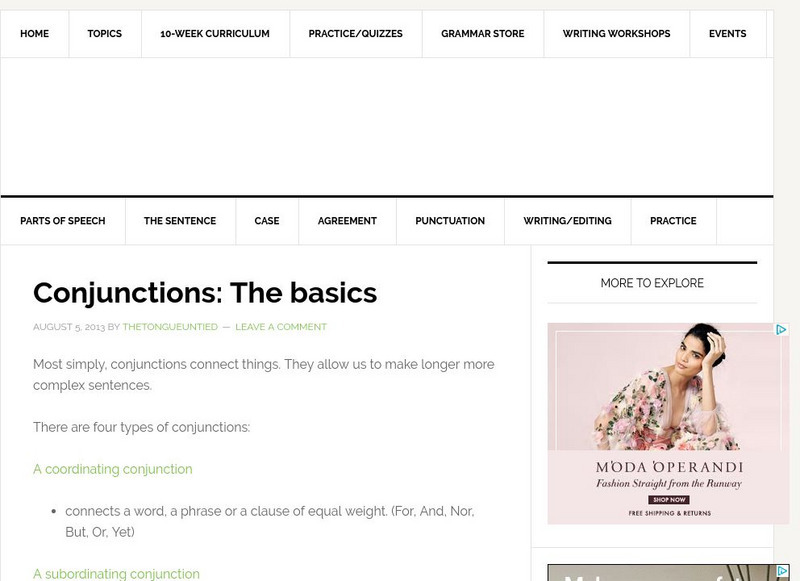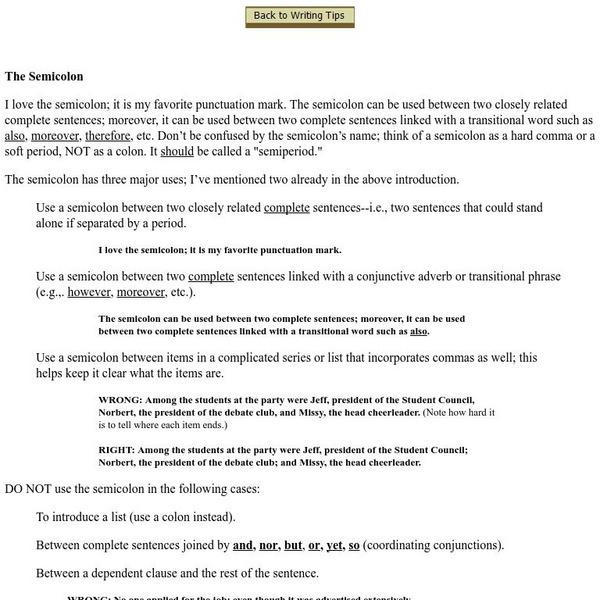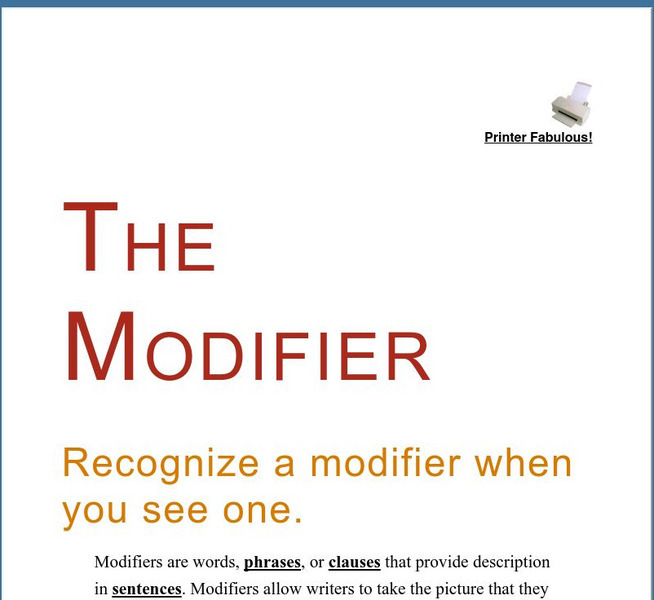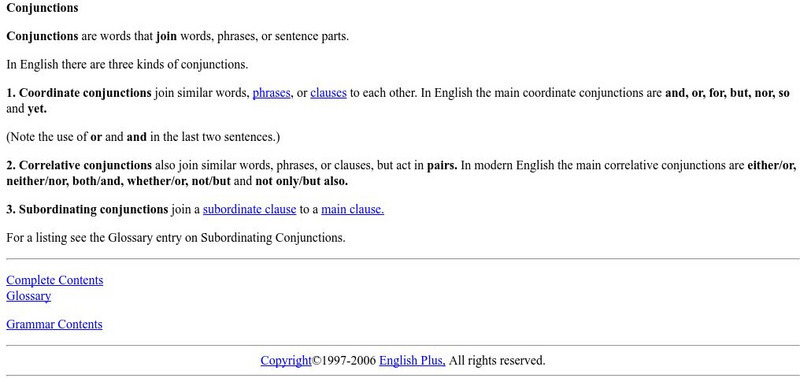PBS
Pbs Learning Media: How to Use Commas for Introductory Elements
Introductory elements are clauses, phrases, and words that appear before the main part of a sentence. Without commas, the reader may be confused. Use commas to indicate properly the who and the what. [0:40]
PBS
Pbs Learning Media: How to Use Conjunctions
Conjunctions are a part of a speech that connects different parts of a sentence, such as groups of words, clauses, or phrases. [0:41]
PBS
Pbs Learning Media: How to Avoid Dangling Modifiers
Modifiers are phrases, clauses, or even just words that add description. In clear sentences, modifiers are next to target words they are describing. Dangling modifiers are modifiers with no target to describe, which can confuse many...
Robin L. Simmons
Grammar Bytes: The Sentence Fragment
Printable information is provided that demonstrates how to identify a sentence fragment.
University of North Carolina
University of North Carolina: Writing Center: Fragments and Run Ons
What are sentence fragments and run-on sentences? Explore this informative resource to review the meaning and some examples of these. Provides techniques for avoiding fragments and run-ons in writing assignments.
University of North Carolina
Univ. Of North Carolina: Seeing and Correcting Sentence Fragments and Run Ons
What is a sentence fragment and a run-on sentence? Explore this informative resource to review the meaning and some examples of these. Students and teachers can utilize this informative site to improve their writing skills.
Online Writing Lab at Purdue University
Purdue University Owl: Exercise : Commas After Introductions Exercise 3
This resource provides practice with writing and punctuating sentences with introductory elements.
The Tongue Untied
The Tongue Untied: Conjunctions
Come and learn about all types of conjunctions when you visit this educational resource. This site gives a clear definition of the function of a conjunction. Use the "Turn the Page," function to learn more.
E Reading Worksheets
E Reading Worksheets: Senternce Structure Worksheets
In this learning module, students will learn more about various sentence structures. Reinforcement worksheets are provided. This module is designed to support Tier I, Tier II, and Tier III students via different instructional options.
Capital Community College Foundation
Guide to Grammar and Writing: Fragments and Types of Sentences
Ten questions asking students to identify the difference between complete sentences and sentence fragments.
Towson University
Towson University: Online Writing Support: Comma
This entry focuses on the rules for comma use including listing the uses, explaining the rules, and providing detailed examples.
University of Victoria (Canada)
The U Vic Writer's Guide: Sentence Fragments
This writing lab site defines sentence fragments and gives a tip to help determine whether or not a group of words is a fragment.
Other
Saint Michael's College: Semicolon and Colon
This site discusses the three major uses of the semicolon and provides examples for each of the uses. Also discusses the use of the colon.
Capital Community College Foundation
Guide to Grammar and Writing: Identifying Sentence Parts
The Guide to Grammar and Writing at this site provides an exercise of eight sentences where each word is hyperlinked to identify its role as a part of the sentence.
Robin L. Simmons
Grammar Bytes: The Modifier
Printable information is provided that demonstrates how to identify a modifier in the context of a sentence.
Other
Sjrc Writing Center: Parallel Structure Lesson
This site explains the topic of parallel structure. Numerous examples of sentences with parallel structure are provided.
Khan Academy
Khan Academy: Recognizing Fragments
A fragment is a part of a sentence, but can't be a sentence on its own.
English Plus+
Grammar Slammer Glossary: Conjunctions
This site offers a basic definition of conjunctions, with hypertext links to related terms (phrases, clauses, subordinate clauses, and main clauses). Addresses coordinate, correlative, and subordinate conjunctions.
University of Victoria (Canada)
University of Victoria: Grammar Topics
A large collection of concise explanations of various aspects of English grammar and usage. All topics include exercises that can be done, checked, and corrected online. Solid resource for English language learners at the intermediate...
Capital Community College Foundation
Guide to Grammar and Writing: Sentence Subject
Part of larger website devoted to sentence structure, grammar, and writing skills, this tutorial teaches the subject of a sentence--the person, place, thing, or idea that is doing or being something.
Grammarly
Grammarly Blog: Dangling Modifiers
This Grammarly Handbook resource clarifies the topic of dangling modifiers."How to" directions for correcting sentences with dangling modifiers are provided.
Sophia Learning
Sophia: Parentheses
This lesson introduces parentheses and how they are used. This tutorial lesson shares a short slideshow with the lesson's content.
University of Victoria (Canada)
The U Vic Writer's Guide: Knowing the Basics of Grammar
This grammar tutorial for college students features help on verb agreement, the use of semicolons, sentence structure, and more.
Capital Community College Foundation
Guide to Grammar and Writing: Run on Sentences
This site shows how to repair run-on sentences. Students and teachers will find this interactive resource helpful.
Other popular searches
- Clauses and Phrases
- Commas in Phrases and Clauses
- Adverb Clauses and Phrases
- Grammar Phrases and Clauses
- Joining Phrases and Clauses
- Proverb Phrases and Clauses
- Clauses Phrases
- Clauses Phrases Punctuation


















